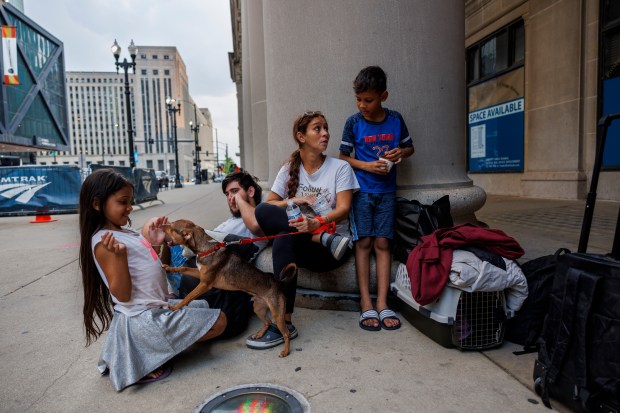When Esperanza Mendez went into surgery in January, her two youngest children had nightmares about what could go wrong.
They had spent the past few weeks in fear. Arguments between their parents filled the apartment. Empty liquor bottles covered the kitchen table. The fighting got so bad, their dad moved out.
Now, their mom was being put under anesthesia — something they didn’t even know existed — to remove a large lump on the right side of her neck. If it didn’t go as planned, they worried they would be completely alone.
“I want to go with you!” Esperanza’s 11-year-old daughter, Yuledy, said the night before the surgery, hugging her tightly.
Though doctors assured them the procedure was routine, it was hard on the Mendez children, who had just moved to the South Side of Chicago after a long trek from Venezuela. Everything was hard in those first few months: school, meals, family disputes, their unresolved immigration statuses.
In 2023, the Tribune followed the Mendez family of five — Esperanza, her adult son, Fabian, his girlfriend, and Experanza’s two youngest children, Yuledy and Pedro — on a bus and train from El Paso, Texas, to Chicago last July. They had risked their lives to make it to the United States. A year later, they find themselves in deep isolation.
More than 7.7 million Venezuelans have fled their country since 2014 in the largest population displacement in Latin America’s recent history, and city estimates show that roughly 45,000 of them have passed through Chicago over the past two years. Following the disputed victory of incumbent President Nicolás Maduro in this month’s election, which was discredited by the U.S. government Thursday, immigration experts say the exodus will likely continue.
In Chicago, a city of more than 2.6 million and routinely considered among the most segregated in the country, thousands of migrants have settled into neighborhoods mostly on the city’s West and South sides, untethered from a support system with familial and cultural ties. Unlike waves of immigrants before them, there is no established community for the mostly Venezuelan migrants.
Many are strained financially in neighborhoods they feel are no safer than the ones they fled. Their new housing often comes unheated and unfurnished. And most of their time is spent inside, a far cry from the opportunities and resources they’d hoped they might find when they left their home.
“For months, my mind has been distracted. We’ve been in survival mode. It’s hard to keep up with everything,” said Esperanza in a recent interview. “All the while we’re worried about the people in our own country.”
The fighting
For the past year, the Mendez family has watched news headlines of thousands of migrants who hadn’t been able to cross the southern border knowing they faced kidnappings and extortions in Mexico.
They counted their blessings that they had made it to the U. S. But it hasn’t been an easy transition.
In the spring of 2023, the Mendez family had left behind a country in the midst of an economic collapse. The kids’ schools had closed and city’s grocery stores shuttered. Esperanza, which means “hope” in English, had one goal in mind: to reach Chicago, where her partner, Hugo Sanchez, the father of her two youngest children, was living.
The family traveled for months across Central America, surviving the notorious Darién Gap, a deadly jungle between Colombia and Panama, where they witnessed migrants swept away in deadly rivers. It took them just under two months of walking and taking buses to reach the U.S. border. They arrived in El Paso — one of the world’s largest urban border regions — on July 11, 2023. They didn’t have to wait long.
The Tribune met them the very next day as they planned to take a bus to Denver, tickets paid for by the pastor of a church. From there, the Mile High City paid for the family to take a train to Chicago. The entire trip from the border to Chicago took 48 hours.
Esperanza’s partner, Hugo, picked them up at Union Station and took them to his apartment in Englewood. But the relief of finally arriving soon gave way to the reality of their situation.
“It’s good to be here, but it’s hard too. Everything is so complicated. We’re far from our family,” said Esperanza a little over a month after settling in.
The Mendezes had moved into the second-story, three-bedroom apartment, where Hugo and his two nephews were already living. Shortly after moving in, Fabian’s girlfriend, Yolexi Cubillan, 20, gave birth to a baby boy that September.
Soon after, the small space grew even more cramped.
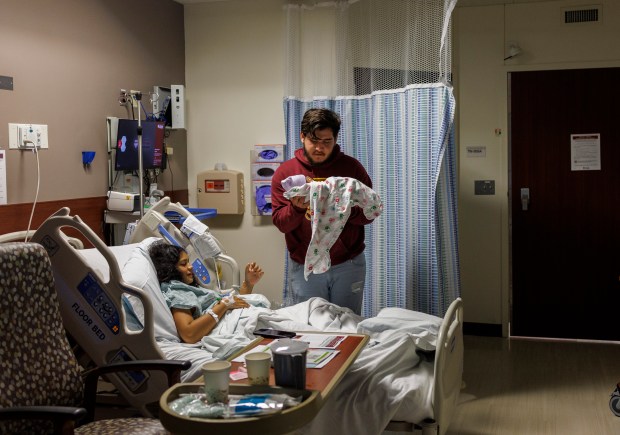
In late December, a friend of Esperanza’s 20-year-old son, Fabian, also moved in. The friend had migrated from Venezuela, and the family opened their doors to him.
“I wasn’t going to turn my back on him,” said Esperanza. “We all migrate here. Todos migramos.”
Indeed, the South Side neighborhood has become home to hundreds of asylum-seekers, if not more, under a state housing program created to help resettle migrants from city-run shelters into rental housing. Of the more than 6,000 families resettled across the city, about 350 houses were rented to migrants in Englewood, making the neighborhood one of the most populated with asylum-seekers.
Even so, the family still felt deeply isolated and lonely. They had just spent a difficult Christmas together, scraping by with barely enough money for food and presents for the children. It affected the two littlest, who didn’t quite carry the same excitement in Chicago for the holiday as they did in Venezuela.
The family’s decorations had been sparse, there were no traditional fireworks and they didn’t eat hallacas, the tamales that Venezuelans have at Christmas. Adjusting to a new life, they had to make do with what they had: family.
But after Fabian’s friend arrived at the apartment a few days later, tension began to rise.
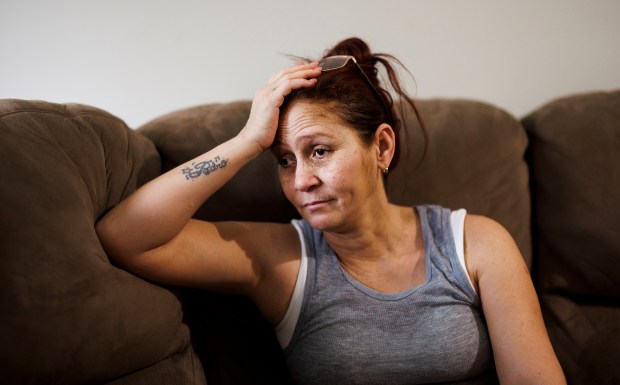
Esperanza and Hugo now had eight additional mouths to feed, not including themselves. Hugo, a tall, large-framed man who had arrived in Chicago several months before the family, would get high around his kids. He spent his days scrounging for work and his nights drinking with the Honduran men who lived in the apartment below them.
He expressed repeatedly that he wanted to go back to Venezuela, and that he was stressed out and depressed. He paced around the apartment in frustration.
Yolexi sensed Hugo even had a grudge against her for living there.
“He looks at me like I’ve done something wrong,” Yolexi confided.
Hugo’s nephews would cluster in a group in the small kitchen and curse Esperanza. They told her the family should leave since they weren’t pulling their weight in rent with the money they earned through Fabian’s occasional painting jobs and Esperanza’s infrequent housecleaning gigs.
The strain reached its breaking point the night of Jan. 12. Esperanza confronted Hugo about why his nephews were being so hateful. The men got mad, and one tripped Yolexi while she was holding her newborn. Esperanza was so furious she pushed him back, she said.
Then she grabbed a knife and flashed it at him. They called the police, Esperanza said.
According to an Englewood District (7th) police station dispatcher, a call for service at their address stated a woman was threatening the caller with a knife, and that she could be heard in the background banging on the door.
Esperanza said she believed the group called the police to kick her family out of the apartment that night. Police officers defused the situation, she said.
“Everybody’s fine,” police told the Tribune, as officers wrapped up the scene.
“They’re Venezuelan,” one officer said to another.
After the police were called, Hugo and his nephews moved to the first-floor apartment. They didn’t speak to or look at Esperanza for days, she said. The family was thankful for the space and relative quiet.
Esperanza acknowledged that leading up to the police call, she acted in ways she regretted later. She thought about what she could have done differently. The fighting, she said, was hardest on her kids.
“It’s much worse when a person you love accepts you and then afterward treats you badly,” she said.
Though she desperately wanted to leave after everything that had happened in January, she had little income and no network in the U.S.
The housing market was tight, and it was hard for them to find something affordable with their limited incomes. And as a woman, she faced additional risk. Experts have said that migrant women may be more likely to be exposed to sexual exploitation and sexual harm — especially if they are homeless and without legal support.
So she and the family stayed put. They had been in Chicago for six months.
Surgery
To make matters worse, Esperanza was worried she might be dying.
She had come to the U.S. with a large tumor on her neck that had been growing for three years, putting pressure on her spine and causing pain in her arms and legs.
Last November she spent 14 hours waiting in the Stroger Hospital’s emergency department, one of the busiest Level 1 trauma centers in the nation and today the city’s leading hospital responding to migrants from the southern border. She went to the emergency room to test for cancer because she didn’t have health insurance.
Her two children who accompanied her. They were terrified of losing her. They didn’t know who would care for them or what their future would look like if she was gone.
“Does it hurt, Mom?” Yuledy asked in November.
“Yes, my arms hurt. Everything hurts a lot,” Esperanza said to her.
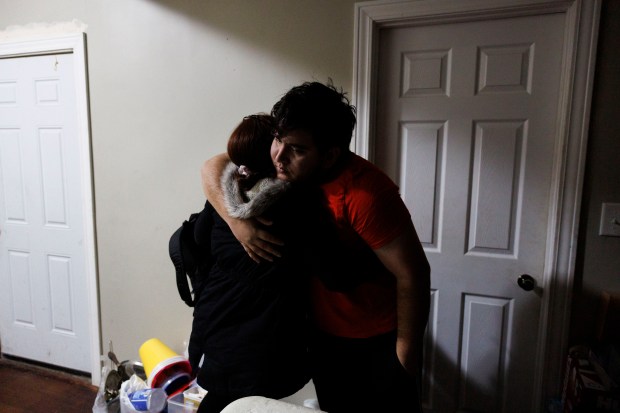
After a CT scan, doctors told her the tumor was likely a benign ball of fat called a lipoma and that she would need surgery to remove it.
Esperanza was concerned about the invasiveness of the neck operation in a part of her body that seemed so fragile. But she wanted to get rid of the pain, so she moved forward with it. The operation was scheduled for Jan. 29.
The morning of the surgery, Esperanza said she had stayed up all night with her daughter. Her team of doctors had told her they needed to put a tube down her throat, and that they would draw a lot of blood. She cried, thinking about her children and the financial situation they were in. They cried too, she said.
Over the past two years, Cook County Health has spent about $30 million on total migrant care — everything from routine checkups to emergency medical procedures like surgeries and radiology. Their collection of hospitals and clinics has seen more than 33,600 migrant patients, with over 111,000 visits, a hospital spokeswoman told the Tribune.
Esperanza’s surgery lasted several years. After it was over, she lay in the hospital bed, her face white. She leaned up occasionally and grabbed the side of the bed for strength.
Tubes ran up through her arms. Her neck had a thick gauze bandage covering the spot that had been removed. Nurses had placed a rose on the table and the windows of several tall buildings could be seen from the hospital bed.
When she Facetimed her mother, whom she has described as the most important person in her life, Esperanza broke down into tears
“Stay still and calm,” her mother said, thousands of miles away in Venezuela.
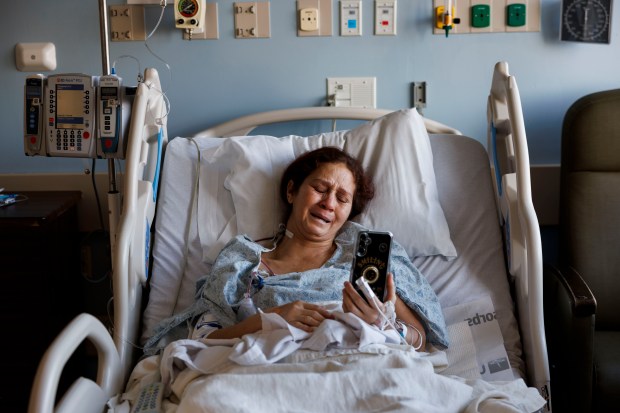
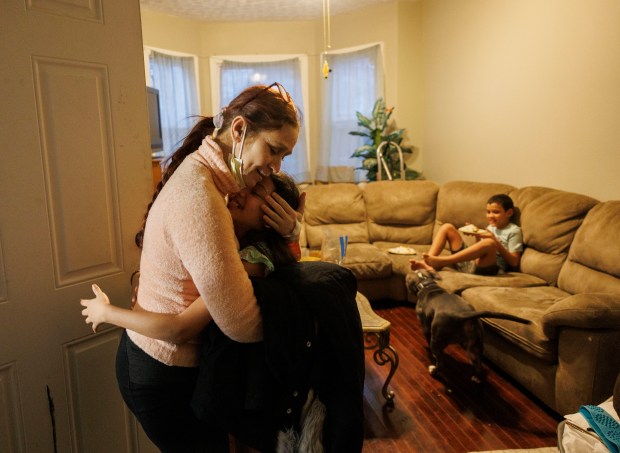
To Yuledy, who waited back in the Englewood apartment, Esperanza downplayed her pain.
“I couldn’t eat, thinking about you, Mommy,” Yuledy said through the phone, her face close to the camera as she talked.
Esperanza cut the call short to tell the nurse she was nauseous and then threw up.
She sat in her bed, vulnerable — clothed in a hospital gown, pale and sad.
‘Papi, te quiero’
When Esperanza came home from the hospital the next day, her children were waiting for her in the window of their second-story apartment. They hugged her when she walked inside. She kissed their heads.
“God bless you. I missed you,” she said.
For weeks afterward, she said she had trouble moving the right side of her body. She spent most of the time in her bed. She said she sometimes had a shooting pain in her neck. She relied on her kids to bring her medication, to prepare meals and clean the house.
In mid-February, Hugo abruptly decided to leave the U.S. and flew back to Venezuela. Esperanza was still recovering; Yuledy was despondent. Esperanza wasn’t sure how Hugo had returned to their home country or paid for the journey because she wasn’t in touch with him and didn’t want to reach out.
Esperanza came to Chicago because she knew Hugo was here, too. But their relationship had fallen apart amid the stress, worry and bad behavior. The family’s needs had fallen almost entirely on her shoulders — not an uncommon occurrence for migrant mothers. After traveling thousands of miles to make it to the U.S., some migrant men seemingly abandon their partners and children, leaving them to fend for themselves.
One of Hugo’s nephews moved out of the bottom unit, she said, but the family has had limited communication with them both. Alone, Esperanza worried about the $1,400 she had to pay for rent, with additional gas and electricity bills.
Luckily, she said, the landlord was patient with her late payments while they gathered what little money they had. Fabian took on all the financial responsibility. He worked any job he could find — construction, moving — but it often wasn’t enough. The family washed their clothes by hand and used T-shirts as dishrags to save money.
“It’s all a sacrifice. We have to sacrifice,” she said.
Hugo still tried to communicate with his daughter over WhatsApp. Yuledy drew pictures for him.
“Daddy, I love you. Papi, te quiero,” she wrote on one, which she covered with purple stickers.
Eventually, Hugo also sent Esperanza WhatsApp messages from Venezuela — saying that he was sorry and wanted to come back.
She responded that he had made his decision and she had nothing to say to him.
Seven countries away from their father, the kids were growing up.
Pedro, 10, was getting taller and stronger, more “inquieto” or restless, as Esperanza liked to say. Yuledy started asking for more material things from her mom: makeup and clothes.
It saddened Esperanza to think about her children’s unrealized dreams for the U.S. Yuledy had wanted to learn how to swim. Pedro had wanted to learn English. They’d wanted to make friends.
Though Venezuela wasn’t always stable, at least her kids had the freedom to play outside, Esperanza said. They would run in the streets, climb trees and eat mangos that had fallen on the ground, she said.
Esperanza said she didn’t feel comfortable letting them play in Englewood, a neighborhood that has faced poverty and disinvestment for decades. While gun violence has been down in Englewood for several years in a row, it remains one of the most violent of the Chicago Police Department’s 22 patrol districts.
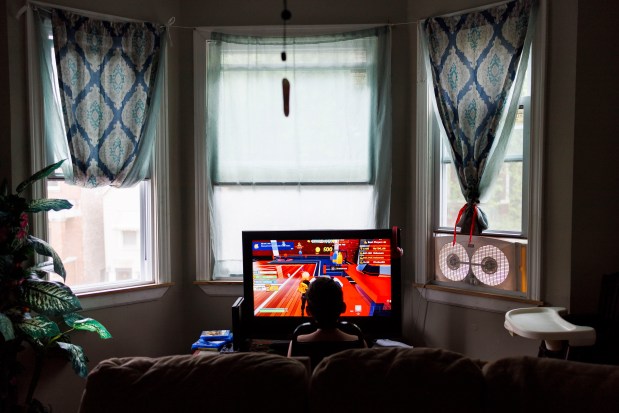
But Esperanza worried when her kids went to the nearby park. When Pedro and Yuledy weren’t at school, they spent most of their time, in their room on their phones.
And when they were at school, they fought with other kids. Esperanza would get calls from administrators that they were in some type of conflict or argument and she would have to go and pick them up. Pedro came home several times with bruises on his face.
Since August 2022, Chicago Public Schools had enrolled about 8,900 students they identify as “new arrivals,” according to data from early April. To meet the sudden demand of non-English speakers, the district has increased funding for bilingual instruction and added hundreds of bilingual teachers. Even so, schools are struggling to keep up with migrant students’ needs.
After particularly bad fights at school, Esperanza let her kids stay home for weeks at a time.
“Pedro and Yuledy experience the violence of the neighborhood more than any of us do. You can see it in the scars and bruises on their faces,” Esperanza said.
Independence
On the Fourth of July, the family dressed up and went to Walmart to buy food. As they walked through the gate outside their home, they waved a plastic American flag around and said they were excited to see the fireworks. Pedro held Fabian and Yolexi’s baby and ran on the sidewalk, laughing.
The couple had named the baby Derick Galue. Though he was born in the U.S., it took half a year for Yolexi to get a birth certificate. The family finally received it in the mail in March, after navigating a confusing bureaucratic process and worrying for months she might never get his documentation.
But now it was official: They had an American in the family. They needed to celebrate the country’s Independence Day, they joked. They put a little red, white and blue top hat on his head and took pictures of him standing outside their home.
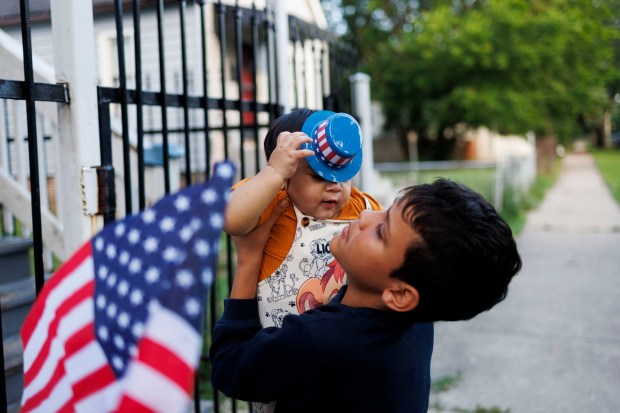
Esperanza said that on the nation’s birthday, she’d been reflecting on how much harder life in the U.S. can be for noncitizens. She said that with everything happening in their home country, they were lucky to have a roof over their heads. They wanted to do everything right.
“The hope of the American Dream hasn’t left us. We keep moving forward,” she said.
At a know-your-rights clinic hosted by the nonprofit Centro Romero over the winter, the family was informed that they needed to apply for asylum — a form of protection that allows those who face persecution or harm in their country of origin to remain in the U.S. — within a year of arriving.
A social worker there told them that if they didn’t apply, the judge would order a deportation order.
The family said they knew of other migrants in Chicago who had entered the country but failed to appear at their hearing. They knew these people might be deported and didn’t want to take the same risk.
“More than anything, I want to get my legal papers,” said Esperanza.
In the weeks before their first anniversary in the U.S., they worked with a friend who had expertise on how to fill out their applications, they said, including individual letters detailing their reasons for seeking asylum.
Esperanza wrote in hers about the violence she faced in Venezuela at the hands of armed men working under the country’s president. She wrote about how her eldest son had been murdered by those groups during a rally in the street.
“They beat us, they broke into homes to steal, and they wanted to silence our truths,” Esperanza wrote.
On July 8, just a few days before their deadline to apply for asylum, Esperanza and Yolexi went to Chicago’s immigration court in the Loop and waited in line for hours. There are currently 251,168 pending immigration cases in Illinois, the highest number ever recorded.
The family didn’t know how exactly the asylum process would work after they handed in their documents, but they were told they had to wait five months before applying for a work permit to get a legal job.
“Despite the setbacks we’ve had — the sadness, the problems, the financial difficulties — we’ve had some beautiful moments here, too,” Esperanza said.
At home, they speculated how West Garfield Boulevard got its name.
“Probably because of Garfield the cat,” said Esperanza, laughing. “There are a lot of cats in Englewood.”


